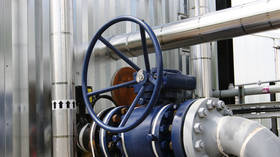Germany calls out Russia over ‘political’ gas cut
Russia’s Gazprom has slowed deliveries from the Nord Stream pipeline, citing technical issues caused by Western sanctions
Berlin has condemned Russian energy giant Gazprom’s decision to cut the gas flow through the Nord Stream pipeline over technical difficulties, with the country’s economy minister, Robert Habeck, claiming the move was politically motivated.
“I have the impression that what happened yesterday is a political decision and not a decision that can be justified in technical terms,” Habeck told reporters on Wednesday.
The Saint Petersburg energy giant said it would reduce the capacity of gas supplies via the Nord Stream pipeline by 67 million cubic meters per day to some 100 million cubic meters. The company explained it had to halt operations at one more Siemens pumping unit, blaming the technical issues on Western sanctions. Namely, the repaired gas pumping units for the North Stream pipeline cannot be returned from a factory in Canada due to the country’s embargoes against Russia.
“Due to the expiration of the time before overhaul (in accordance with the instructions of Rostekhnadzor and taking into account the technical condition of the unit), Gazprom is halting the operation of another Siemens gas pumping unit at the Portovaya compressor station,” the company said.
Habeck, however, challenged this assessment, expressing doubts that switching off a single unit could actually affect some 40% of the flow. The minister also said the maintenance work on the pipeline that would have had a “relevant” effect on the flow was due to be carried out by Siemens only in the fall of this year.
Habeck also claimed that the maintenance work isn’t subject to sanctions on Russia, revealing that he personally consulted with the European Commission on this matter. Berlin is also in talks with Ottawa to determine whether the pumping units stuck in Canada are included in the sanctions or not, Habeck said.
The Nord Stream, running under the Baltic Sea, connects the Portovaya compressor station in Russia to its counterpart in Greifswald in northeastern Germany. The European market receives some 55 billion cubic meters of gas per year via the pipeline.
You can share this story on social media:








Comments are closed.